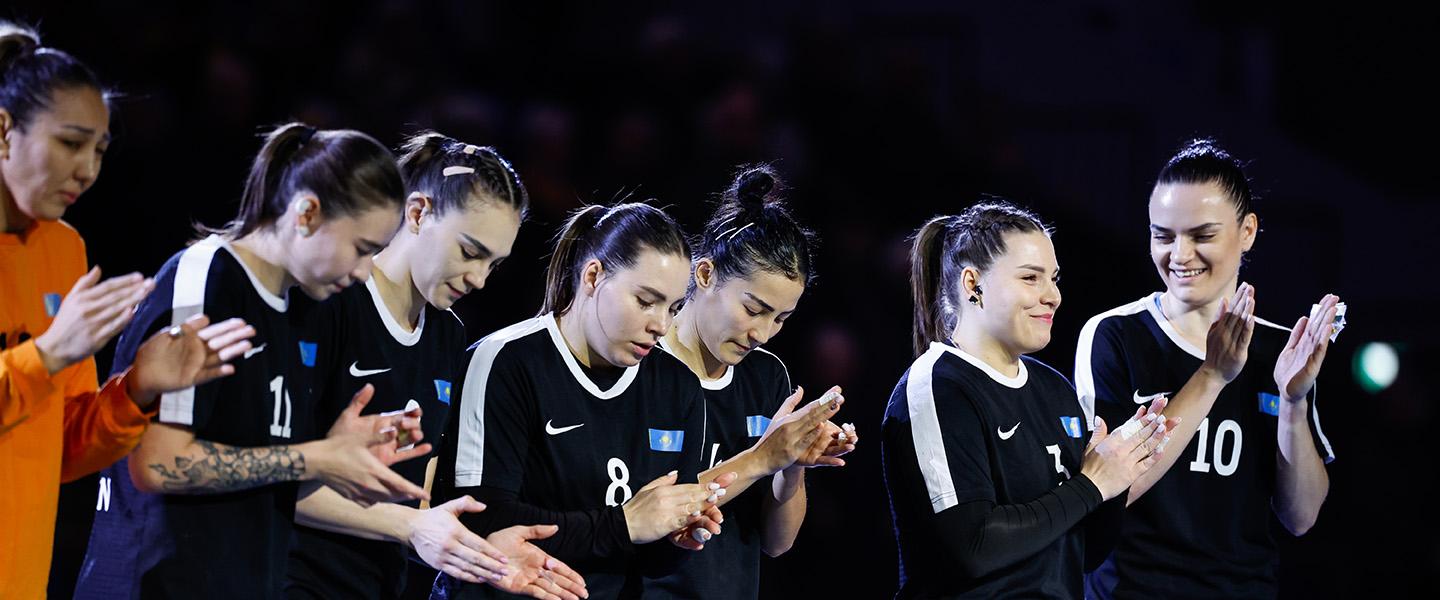Established Kazakhstan look to progress on world stage
19 Nov. 2025

After grabbing bronze at the 2024 Asian women’s championship, Kazakhstan secured their ticket for Germany/Netherlands 2025.
The qualification ensured a third, consecutive appearance at the global event and eighth overall since their debut in 2007 – with just two championships missed, in 2013 and 2017.
A debut appearance ranking of 18th remains their best-ever finish, with 30th in 2023 their worst.
“Our goal is to play high-quality handball, fight in every match and achieve the best possible result,” said Kazakhstan’s Damira Zhaparova to ihf.info.
“The fact this our fourth consecutive world championship is the result of the tremendous work of our entire team, the coaching staff, the federation, and everyone who supports us. This shows that we are growing, becoming stronger, and confidently maintaining our place on the international stage.
“The most important thing for us at Germany/Netherlands 2025 is to give it our all, support the team, and make our fans happy. We are determined to work hard, support each other, and represent Kazakhstan with dignity on the international stage.”
Kazakhstan are coached by Belarusian coach Aliaksandr Sytsko, who has experience of coaching the Belarus women’s national team (2015-21), became involved with Kazakhstan in July last year, leading the Kazakhstan women’s youth team at the 2024 IHF Women’s Youth (U18) World Championship in China where they finished 27th.
After leading the team to bronze at the Asian Championships last year, he returned to coaching in Belarus with club side, Vitebchanka, who play in the Belarusian championship. Ahead of Germany/Netherlands 2025 he again took a break from club duties, telling local media he is “focused” on the national team work after extending his national team contract with the Kazakhstan federation.
"I'm trying to get the Kazakhstani handball players to believe in themselves and stop being afraid of their opponents,” said the coach when reflecting on their continental campaign to local media.
“Japan, China, and Korea certainly have a different style of handball to ours. The players are faster, more dynamic, press high, rarely play 6-0 defence, and defend quite aggressively. This is probably due to their anthropometric differences. And the girls there look physically strong, visually different from the Kazakhs. The Japanese, Chinese, and Korean players, on the other hand, strictly adhere to their daily routines and nutritional guidelines,” he added about the differences in the teams within the region.
“I was impressed by the speed of Japan and Korea in the final —chasing them is pointless, so you have to impose your style on them and find tactical solutions. I partially succeeded in this in the semifinals, and I hope I'll have another opportunity to play against such opponents.
That opportunity will present itself when his side face Korea in their last of three preliminary group games (1 December) following clashes against Angola (27 November) and Norway (29 November).
It will be the third time the two have met at a world championship, both previous times Korea have taken clear wins: 39:21 in 2009 and 31:19 in 2011, with 16 out of their 18 previous mutual matches ending with a win for Korea. The only two Kazakhstan wins came in the AHF Asian Women’s Championship finals in 2002 and 2010, when the Kazakhstan side won the title.
The last four mutual meetings were secured by Korea in double-digits, with the two sides meeting at the AHF Asian Women’s Championship in 2024, Korea taking a 30:20 victory.
Norway’s record also features clear wins – in all three matches played so far. A 35:19 Beijing 2008 Olympic Games victory, 40:19 Denmark 2015 world championship win and 46:18 win six years later, at Spain 2021. Kazakhstan have faced Angola once, also at Beijing 2008, the game ending in a 24:24 draw.
“We'll try to make some adjustments to the training process,” added Sytsko about the new regime his squad faced last year and which has continued into 2025. “I see that the girls are generally receptive to my changes. The main thing is not to be afraid of anyone, and not to approach matches against the favourites as if they were being slaughtered.
“We need to change our mentality and understand that our opponents are also people of flesh and blood. If you don't have this in your head, no matter what tactical tweaks you try, nothing will work.”
Back in October, Kazakhstan faced Belarus in two friendly games, losing twice (47:23, 42:27).
Kazakhstan’s provisional squad features 28 players, three of which play outside the country, in Greece – centre back Dana Abilda with AEP Panorama, Azerbaijan – centre back Aida Zhaparova with HC AzerYol and North Macedonia, with right back Kristina Radayeva with HC Gjorce Petrov.
Experienced and key players named include left back Irina Khassakanova and right wing Zhanerke Seitkassym. Both were part of the 2024 Asian championship All-star Team.
Key players: Irina Khassakanova (left back), Damira Zhaparova (goalkeeper), Zhanerke Seitkassym (right wing)
Coach: Aliaksandr Sytsko
Qualification for Germany/Netherlands 2025: Asian Handball Federation (AHF) Women's Handball Championship: 3rd
History in tournament: 2007: 18th, 2009: 22nd, 2011: 19th, 2015: 22nd, 2019: 22nd, 2021: 24th, 2023: 30th
Group at Germany/Netherlands 2025: Group H (Angola, Norway, Korea Republic, Kazakhstan)

